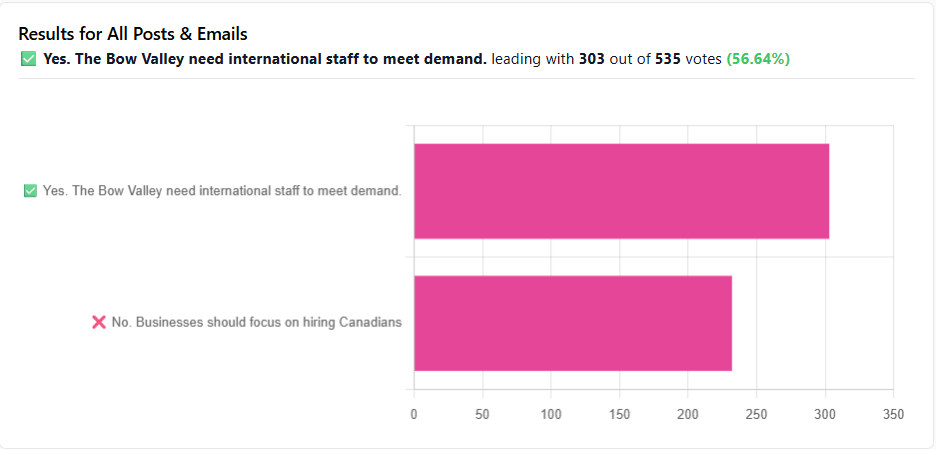- Bow Valley Insider
- Posts
- The Bow Valley's Reliance on International Staff
The Bow Valley's Reliance on International Staff
National policies on housing and unemployment don’t always fit resort towns

What’s Happening? In Tofino, B.C., businesses say new restrictions on Canada’s Temporary Foreign Worker Program are making it harder to staff hotels and restaurants. The same pressures are felt in the Bow Valley, where tourism demand far exceeds the local labour pool.
The Bow Valley Reality. Like Tofino, Banff and Canmore have small permanent populations and high seasonal demand. Employers often struggle to fill positions locally, especially in hospitality and retail. For years, international workers have helped bridge that gap, and if you have ever ordered a flat white in Banff you already know half the town runs on Aussies.
Local Voices:
Doncath Holdings, which runs nine Banff gift shops, says about 30% of its staff are foreign workers. The federal cap on “low-wage” positions, defined in Alberta as jobs paying under $36.00/hour, has been reduced to 10%. General Manager Rebecca Lipes warns they may not be able to keep all stores open.
The Banff & Lake Louise Hospitality Association has said the new rules could mean the loss of “hundreds of workers” in the region, adding that some roles have “always been difficult to fill.”
The Town of Banff has formally acknowledged how dependent the local economy is on international staff. In a recent report, the municipality noted it is advocating for temporary foreign workers while cautioning against “anti-immigrant sentiment.”
The Policy Shift. Ottawa wants to reduce the share of temporary residents in Canada from 7% to 5% by 2027. Work permits must now be renewed annually, and businesses must rely on fewer foreign staff than before. Supporters argue this will free up jobs for Canadians and ease housing and service pressures.
The Bigger Picture. The debate highlights a tension: National policies on housing and unemployment don’t always fit resort towns that rely on seasonal labour. Whether Banff, Canmore, and similar destinations can sustain their tourism economy under the new rules is still uncertain.
Locals Vote: Should Banff & Canmore Continue Relying on Foreign Workers to Fill Tourism Jobs?
We asked Bow Valley Insiders to vote. Out of 535 responses, 56.64% said that the Bow Valley needs international staff to meet demand.

Community Comments
Here’s what locals said in response to the poll:
The Aussies in Banff are not temporary foreign workers but are part of a reciprocal exchange program that also allows young Canadians the opportunity to work in Australia. Canada has had such "holiday work visas" for university students going back to the 1970s.
Many restaurants and pubs in the UK do not have servers. You order at the bar, and the beverage and food are brought to your table. It’s very efficient. The WestJet lounge at the Calgary airport works the same way — you view the menu and order from a QR code, and your meal is brought to the table. Let’s take Canmore into the future of technology in hospitality. Canadians are hard to find, and it’s not going to get easier, so let’s be proactive.
I have worked in the Bow Valley for years. Real estate business owners do not pay fair wages and never planned for staff housing, which used to be mandatory in the 1970s in Banff. Even those with degrees in accounting, HR, or marketing get paid poorly. Many businesses will not hire older workers or those with disabilities because their spaces aren’t accessible. Communities need a serious plan for sustainable work models.
Tourist destinations should be allowed to hire all the staff they need. If foreign workers fill the gap, then they are needed. The people who come here are usually temporary and leave after a year or two.
Both of my kids, born and raised in Calgary, applied for jobs in Banff and were not hired. There are people in Calgary who want to work — make it possible for them to find jobs and housing.
I avoid shops that hire temporary foreign workers. It’s a life of indentured servitude for them, and our Bow Valley youth struggle for work.
My son, who is local to Banff, struggled to find full-time work due to temporary international workers.
The driver here is the never-ending demand for more visitors. That creates the need for more foreign workers as local supply stays small. Who benefits? Business owners, foreign workers, and tourists. Who suffers? Locals and the environment. We need to slow this train down, even if a few businesses fail.
We absolutely need foreign workers to fill jobs in the Bow Valley. I have owned businesses here for over 30 years, and it has always been hard to find staff.
Your coverage should include a third option: “Should Bow Valley businesses pay Canadians a reasonable wage?” You can’t get a hotel in Banff for under $500 a night, yet salaries haven’t risen in a decade.
There are enough workers in Canada who need jobs. If employers paid well and offered living wages, they wouldn’t have to rely on cheap labour. The dependence on temporary foreign workers is basically wage subsidy abuse.
With high unemployment, it shouldn’t be hard to find staff.
Less turnover means less time wasted looking for long-term employees.
We should always hire local and Canadian workers first, and if that doesn’t fill the gap, then hire foreign workers.
Just leave things as they are. If Canadians wanted these jobs, they would apply. Most don’t want to work in resorts or hospitality.
Canadians don’t seem interested in these roles. It’s an adventure for international workers.
International workers are reliable and hardworking. Many Canadian-born people don’t want the workload or hours. Bring in the staff we need to meet demand, especially as the government promotes more tourism.
It may take time to shift to hiring Canadians, but better advertising and recruitment could help. Tap into the 17% youth unemployment rate.
Canada’s tourist and agricultural industries have always relied heavily on international staff.
Youth unemployment is high across Canada. Canadian companies need to train local talent.
It’s harder and harder for Canadians to get jobs right now.
The problem isn’t that employers don’t want to hire Canadians; it’s that there aren’t many who apply. Those who do often don’t show up for interviews or quit after a week. Maybe we need to reform EI to encourage people to work.
I know many Canadians who’ve had to leave the Bow Valley because they couldn’t find work. Support local, hire local.
Our economy is declining due to a lack of foreign workers. Universities and rentals are struggling without them.
Even if Canadian businesses try to hire Canadians, they rarely apply. Out of 15–20 applicants, maybe one is local.
Banff would be better off if large retailers didn’t dominate downtown. They rely on low-wage foreign labour, trapping workers in jobs with no mobility.
Businesses making record profits should pay living wages. You can’t charge $1,000 a night and pay minimum wage.
Employers should house employees or raise wages. If the business can’t survive under those conditions, maybe it shouldn’t.
This isn’t about foreign workers versus Canadians. Businesses rely on foreign labour to keep wages low. Reducing foreign workers could pressure them to pay fairly and retain locals longer.
Canadians should have the first opportunity for meaningful work experience. Hire foreign workers only if there aren’t enough Canadians.
Locals can’t afford to live or commute to Banff. International workers come with savings and treat it as a short-term adventure.
We should hire more Canadians, but housing must be affordable for them.
Many young Canadians think minimum wage jobs are beneath them.
Canadians also go abroad as foreign workers.
People on unemployment should fill these jobs.
If wages were better, businesses wouldn’t need to rely on foreign workers. Hotels charging $1,000 a night can afford to pay more.
Let Canada continue welcoming international workers — many fall in love with the country and stay.
Give jobs to Canadians.
All businesses do focus on hiring Canadians, but Canadians want year-round jobs, not seasonal ones.
Canadians come first, period.
Maybe more families can offer billeting. And yes, businesses should pay more. If that means fewer souvenir shops or restaurants, so be it.
Foreign workers bring positive energy and are necessary for a great season.
Almost everyone who serves in Canmore is a foreigner. Without them, businesses couldn’t function.
Many young Canadians don’t want tourism jobs or work outside major cities.
Do businesses supply housing to foreign workers? Not likely. We need to solve staff housing first.
The Bow Valley attracts young workers from abroad. They fill seasonal roles but need temporary housing. Offer better pay and locals will apply.
The issue isn’t foreign workers, it’s low pay and lack of housing.
When I was young, I got my start out west. Businesses should work with colleges and give young Canadians the same opportunities.
There are lots of students who would work if housing was available.
Tourist towns like Banff and Canmore should be exceptions when reducing foreign worker numbers.
Foreign workers are an asset. They work hard and appreciate the opportunity.
Businesses should pay wages that attract Canadians from other provinces.
A mix of both Canadian and international workers would be ideal.
Many Canadians are struggling to find work. There needs to be a shift to get them working again.
Canadians can’t afford to live in resort areas, which makes these jobs unappealing.
In Canada, Canadians should come first. That’s common sense.
Employers should develop campaigns to recruit Canadians, especially students. Hire citizens first.
If there are Canadians ready to work, where are they? Many businesses say they simply don’t apply.
Some Canadians avoid service jobs, expecting high pay right away.
Foreign workers spend much of what they earn locally and help sustain tourism.
Businesses should raise wages or scale back operations. Growth in the Bow Valley is out of control.
Businesses relying on cheap labour are essentially subsidized by government policy.
Growth in the Bow Valley has gone too far. Reducing tourism demand would ease worker shortages.
Wealth is concentrated at the top in tourist towns. Spread it around. Hire Canadians and pay living wages.
Resort communities like Banff need policy exceptions, including housing and workforce support.
Businesses have tried hiring Canadians for years with little success. Foreign workers enrich the community and keep it running.
Why should taxpayers subsidize businesses by importing underpaid workers?
This is a worldwide issue. If we want Canadians to fill roles, we must offer housing.
What Do You Think?
Let us know in the comments.
Reply